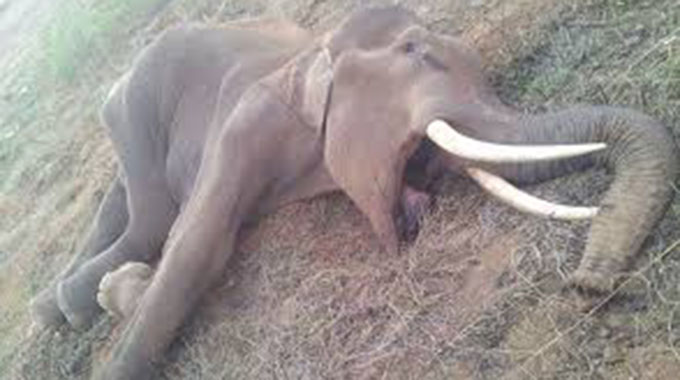
Sifelani Tsiko Agric & Innovations Editor
The African Elephant Specialist Group of the IUCN Species Survival Commission (IUCN SSC) says it stands ready to assist southern African range land countries which have recorded deaths of elephants in recent months.
In a statement, the IUCN SSC expressed concern about the reported mysterious mass die-off of African elephants.
This comes after more than 250 elephants have died in the areas around Seronga in the Okavango Panhandle of Botswana since March 2020.
“The African Elephant Specialist Group of the IUCN Species Survival Commission (AfESG) is aware of the recent cluster of deaths of at least 281 elephants in the areas around Seronga in the Okavango Panhandle of Botswana, since March 2020 to date,” the specialist group said.
“The specialist group stands ready to assist within its capacity and wide international network of experts, including collaborating with the IUCN SSC Wildlife Health Specialist Group. AfESG is in touch with the Botswana government as they endeavour to investigate the causes of the deaths that we expect to be unravelled soon and published.”
The elephant specialist group said the case of localised elephant deaths in Botswana was not unprecedented.
“Large die offs of large wild animals do occur, including from demographic or environmental perturbations, and increasingly from the results of human activities,” the AfESG said.
“Some random examples of such die offs of elephants and other species include the 5 900 elephants that died of starvation in Tsavo, Kenya following a severe drought in 1970s. Starvation has also killed elephants in large numbers in Hwange National Park in Zimbabwe in the early 1980s, 1990s and recently in 2019 some 200 elephants died of the same cause.”
It further stated that 64 elephants died of a viral infection in Kruger National Park in South Africa in the early 1990s.
“On other species, some 200 000 Saiga antelopes died of bacteria triggered by environmental factors in 2015 in Kazakhstan and a further estimated 30 000 Saiga antelopes died from a viral infection from sheep and goats in Mongolia in 2017.
“Environmental factors also triggered a bacterium within black rhinos’ gut killing nine of them in Kenya over a short timeframe in 2010, whereas investigations into the causes of mass deaths of 88 humpback whales in the east coast of the USA between 2016 and early 2019 are still ongoing.”
The AfESG said productive investigations of such large die offs may take time since they often require a multi-disciplinary team to untangle an intricate combination of factors within the affected animals, their environment and their interaction with other wild or domestic animals.
“There are also required investments in the capabilities to examine fresh samples especially when animals are dying remotely or in large numbers over short periods. Support in facilitating collection, transportation, permits issuance, and analyses of samples is encouraged,” the specialist group noted.
Botswana has said a new pathogen may be responsible for the death of hundreds of elephants in that country.
Results from samples taken from carcasses in north west Botswana which were back from laboratories they were sent to in Zimbabwe, will be matched with results coming from South African laboratories.
At least 281 carcasses have been found, according to the Botswana government.
Zimbabwe, Botswana, Namibia, South Africa and Zambia have Africa’s biggest surviving elephant populations in the world.
The elephant population exceed the carrying capacity of some of the major conservation parks.
The countries are sitting on tonnes of ivory which they cannot dispose owing to a CITES ban. Zimbabwe has more than 100 000 tonnes estimated to be worth more than US$100 million.
